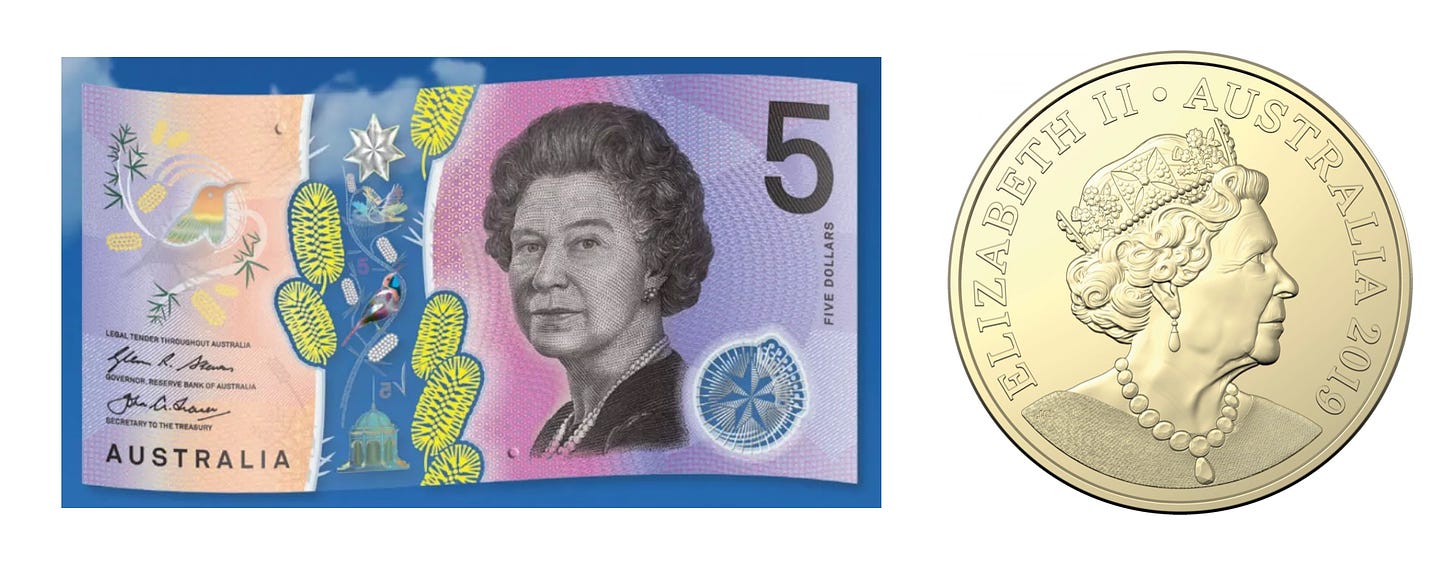(Note that this text version is somewhat abridged compared to the audio version this time around).
It’s the Queen of England’s 70th Jubilee. She has been on the throne longer than any other monarch - perhaps ever. And though I say “The Queen of England”, really she is Queen of the Commonwealth and that includes Australia. It may be difficult for Americans, among others, to really get a feel for what the Monarch means to those who live under one, and what this queen in particular means to people. There is certainly a sense in which the Queen conveys a kind of paternalistic feel to a nation. She is like everyone’s grandmother to some extent. But there is also a deeper sense in which people who are not “anti-monarchists” value the Sovereign. I have written myself about this before. It is an evergreen issue, almost, in countries like Australia. The issue is: why is the Queen - someone born in Britain - head of state in Australia? Now the truth is that in Australia although the queen is on our money - our coins and some notes
- and although “The Crown” is what we in legal terms refer to as synonymous with “The State” and although even our Navy labels its ships HMAS - Her Majesty’s Australian Ships
- the fact is that it is the Queen’s representative who is called “The Governor General” - is where the actual power resides. The power by the way is the power to dismiss a government. The Governor General or their delegate is the person in Australia who can dismiss our Prime Minister. In the UK the Queen can remove the British Prime Minister.
Now this system of democracy is the most stable that has ever existed - fostering the fastest progress that has ever been. It ushered through the British Enlightenment and the Industrial Revolution - times of philosophical, artististic, scientific, technological and moral progress. And it stood up to and overcame fascism and communism and authoritarianism of various kinds. But in Australia there are people who we call republicans - but not like in the US sense. Republicans are just anti-monarchists. They think an Australian should be Head of State. But that term “Head of State” does not appear in our constitution. That position - head of state - is supposed to label the highest ranked person employed by the government. This is different to Head of Government which in Australia and Britain is the Prime Minister. Basically the person who has the widest array of powers to make decisions. The Governor General or Queen is limited to making basically one decision of consequence only. They cannot enact policy. All they can do is decide whether the government can remain in power or not.
But republicans in Australia argue that the monarchy is outdated and the head of state should be an Australian anyway. I used to be among those who thought this. Then I read more and thought more and realised that this notion of the monarchy being outdated is wrong. The monarchy as it exists now - it’s relationship to nations in the commonwealth - has evolved over centuries. It is now a modern outworking of encountering various trials and tests against the reality of a modern political system and modern morality and so on. And what you get after centuries of progress and the winning of wars and so on is: a constitutional monarchy. We love places like the USA for example. To a far lesser extent places in Europe like France and, um, well, Ireland maybe. Haha. But places that have also allowed for rapid progress and relative stability. But nothing much holds a candle to the UK. And its sons and daughters like Canada and New Zealand and Australia. Liberty, stability, rapid progress. A trifecta no other nations can be compared with - except the USA. So for the Queen’s Jubilee I am re-upping my article from 5 years ago https://www.bretthall.org/blog/republicans-vs-monarchists-in-australia and leave here my conclusion from that article: “our Constitutional Monarchy maintains the constant stability that allows for the change that the Parliament brings. To remove that stability that is the very thing that has facilitated our dynamics society is dangerous. We’d then have two seats - the Parliament and the Presidency - both subject to change.
The Crown is the Dignified and the Parliament is the Efficient said Walter Bagehot in “The English Constitution” to separate out the symbolic versus the way things are actually acheived. In modern science-type language: The Crown is the Constant and the Parliament is the Variable.
We change this at our peril.”
The Jubilee included a performance of the band Queen’s hit song from the 70s “We are the champions”. Outside Buckingham palace the new lead singer Adam Lambert belted out
“We are the champions, my friends
And we'll keep on fighting till the end
We are the champions, we are the champions
No time for losers, 'cause we are the champions of the world.”
And it was as if he was singing about the UK. He may as well have been. Britain has always fought against the darkness - of tyranny, of stasis, of disease, war, famine, a lack of progress and so on and on it goes.
The irony is that as someone who leans more libertarian - by which I mean more anti-authority than pro-state, pro-government authoritarian - I lean towards the monarchy because it is the instantiation of power DILUTION. The power of the monarch has been diluted to almost nothing in law. Unlike the opposite impulse where state power has become more concentrated in the bureaucracy. In Australia there is a real push now for a so called Independent Commission Against Corruption. An ICAC. This would be an unelected body that has oversight over the government at the federal level. So separate to the police, separate to other investigative bodies. Another administrative division for the purpose of having power over elected officials. Statists love that kind of thing because it removes power from the elected into the unelected officials who cannot be easily removed by democratic vote. And so this is the problem in any democracy: the bureaucrats who are “the government” to some extent - cannot be removed easily by any election.
The monarch likewise cannot be removed, but the monarch cannot make policy decisions either. Unlike the beaurocrats - who can. And often those bureaucrats seem to have as much if not more power the “ministers” who are, ostensibly, their elected bosses. Consider the head of treasury who can delay decisions made by the elected treasurer for beaurocratic reasons. This is certainly the practise if rarely the principle. If the “officials” in government offices really do not want to enact the policies of the elected representatives, they could very well delay things for months or years or for just long enough until the next election happens as then they might never need to do what that previous government wanted.
Enough of a rant on that. This weekend is a real celebration for some of us about our special nations that have experienced extended peace as well as progress in large part because of our system of government. Anarchy cannot be expected to do better, totalitarianism cannot be expected to - absent a good explanation. And yet here we have democracies achieving the solving of problems faster than any alternative known.
On another related topic: Yaron Brook produced an excellent podcast on the role of police in society. After the most recent school shooting in Texas where some of the police did not go in, there appeared to be universal consensus that these police were too selfish. I thought myself - well, no, that’s not it. It may be cowardice - but cowardice is not selfishness. Selfishness comes with pride: the idea that I am good and I am deserving and I have value. Now as an officer of the state a truly selfish person would see their job as protector to have high value. They would selfishly seek to guard that society and the people in that society because to do so is an extension of self. But a person with low self esteem will hide and cower in a way that is NOT “enlightened self interest”. There is nothing enlightened about that. So I thought all this but then Yaron produced a podcast about it so I have nothing to add about this. But I have listened to a lot of analysis about what happened that day - Yaron has placed values and ideals front and centre of his analysis of that terrible event. It’s worth listening to here:
All of Yaron’s podcasts are worth listening to and everything he does is underrated and deserves more attention - but this episode - just a regular one dropped in the long list of podcasts he produces - is especially good on this issue. What Yaron did not mention but which I was thinking was in the USA like some other places there have been about 2 years worth of people variously saying defund the police and calling police the enemy and in some places police actually behaving like the enemy in places like Australia anyways where excessive force has unquestioningly been used - so all of that bad publicly and poor public sentiment focussed on police and next minute they are being asked to save lives by risking their own. So that’s a factor.
Douglas Murray was on Bill Maher. Well worth watching the whole episode if you can get hold of it - but Youtube does have some clips. Eg:
And one of his comments on this issue was basically: look, as a police officer you do get to walk around with your head held high ordering people around and generally getting to feel important. But the social contract is that for all of that, now and again, you may have to risk your life. Which seems right too. That’s the deal going in.
Finally for today: episode 119 of ToKCast is out all about Work and Heat - it’s an introduction to thermodynamics. This episode contains no readings from Chiara Marletto’s book “The Science of Can and Can’t” - but it is supposed to serve as an introduction to Chapter 6 of that book titled Work and Heat for people who might not have much of a background in any of that.
Until next time…

















The Jubilee, Peace, Progress and Policing